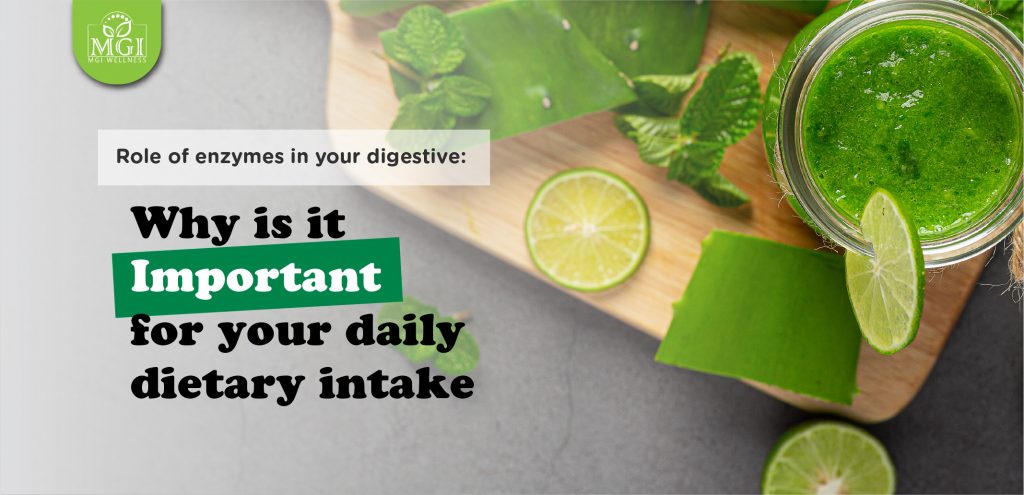Wellness
Role of enzymes in your digestive: Why is it important for your daily dietary intake?
Digestive enzymes are proteins that play a key role in breaking down the food we eat. Our body makes enzymes in the digestive system, including the mouth, pancreas, stomach, and small intestine. Digestive enzymes help our body to speed up the chemical reactions to break down carbohydrates, proteins and fats into simpler forms. This is necessary to allow for the easier absorption of nutrients to provide energy for growth and repair and to maintain optimal health. Without these enzymes, the nutrients in our food go to waste.
Types of enzymes and how they work in the digestive system
Different types of digestive enzymes work to target a specific nutrient, splitting it up into a form that can easily be absorbed. The most significant digestive enzymes are as below.
- Amylase is essential for the digestion of carbohydrates. It is responsible for the breaking of the bonds in starches, polysaccharides, and complex carbohydrates into easier to absorb simple sugars. Insufficient amylase can lead to diarrhea.
- Lactase is a type of enzyme that breaks down lactose, a sugar found in dairy products. With a shortage of lactase, lactose in dairy products that you eat travels straight to the colon instead of getting absorbed into your body. It then combines with bacteria and causes uncomfortable stomach symptoms like gas and bloating. (1)
- Protease breaks down proteins into amino acids. It also helps keep bacteria, yeast, and protozoa out of the intestines. A shortage of protease can lead to allergies or toxicity in the intestines. Moreover, they play a role in numerous body processes, including cell division, blood clotting, and immune function. (2)
- Lipase works with liver bile to break down fats into smaller fatty acids components. If you do not have enough lipase, you will be lacking in fat-soluble vitamins such as A, D, E, and K.
Why do digestive enzymes matter?
Digestive enzymes are closely linked with our digestive system. Thus, it is not surprising that a lack of enzymes often leads to gastrointestinal issues. Some signs you might have an enzyme deficiency include:
-
Digestive Issues
Symptoms of enzyme deficiency tend to first show up in the gut. If your body does not have enough digestive enzymes, it is unable to break down foods properly. As a result, your digestive system and gut may experience a lot of issues such as bloating, gas, indigestion, constipation, diarrhea and sometime undigested food in stools.
-
Poor Nutrient Absorption
If your digestive tract is lack of enzymes, your ability to absorb nutrients may reduce. We need sufficient digestive enzyme and a healthy digestive system for the nutrient absorption process to work optimally. This ensure the food is broken down properly into the vital nutrients, travels down to the small intestines and is absorbed into the blood stream and transports the nutrients to the various parts of the body that need them.
-
Food Intolerance
A person with a food intolerance cannot digest certain foods or nutrients properly because of an enzyme deficiency. The most common example is lactose intolerance. This is when your small intestine does not make enough of the enzyme lactase. This is why some people tend to have diarrhea , gas and bloating after eating or drinking dairy product.
-
Weaker Immune System
In fact, our gut wall houses about 70% of our immune system cells. When our gut is functioning at full power, it acts as a barrier to viruses, bacteria, and pathogens. In contrary, poor digestion and absorption of nutrients can impact the health of your gut, and therefore your immune system.
-
Skin Problems
If your body cannot break down food into nutrients due to lack of enzymes, it could lead to skin problems. Your body needs to absorb skin-boosting nutrients like vitamins A, C, E and zinc to support glowing skin. When you properly digest food, you have access to higher amounts and quality of nutrients, which in turn nourish the skin better.
How to naturally boost your digestive enzymes?
Digestive enzymes really play a vital role in our digestion and overall health. Fortunately, there are natural ways to boost our digestive enzyme production or get them from foods. Here are a few we suggest.
-
Consume Enzyme-Rich Foods
There are many fruits, vegetables and fermented foods that contain relatively high amounts of useful natural digestive enzymes. What you eat has the biggest impact on digestive health. Make sure your diet includes enzyme-rich foods like pineapples, papayas, bananas, avocados, tempeh, miso, kimchi, ginger , garlic and onions.
Pineapples, for instance, contains protein-digesting enzymes called bromelain, which is known for its powerful ability to break down protein chains into amino acids. Papain, an enzyme in papaya, also helps your body digest protein.Study has shown that taking a papaya-based formula may help ease digestive symptoms of IBS, such as constipation and bloating. (3) Meanwhile, avocado is naturally rich in lipase, the enzyme responsible for breaking down lipids.
Fermented food like kimchi and miso contain digestive enzymes lipases and proteases to aid food digestion. Study has shown that miso can reduce symptoms linked to digestive problems, such as irritable bowel disease (IBD). (4) On the other hand, garlic contains enzyme called alliinase is that catalyzes the conversion of alliin to allicin that act as antibiotic and immune system booster while ginger contains zingibain that known for breaking down proteins, facilitating a rapid and smooth digestion.
-
Chew Your Food Thoroughly
Chewing is the initial action that kicks start your digestive juice production. The more you chew, the more digestive enzymes you produce. In contrast, the less you chew, the fewer enzymes you produce, which can lead to a number of digestive problems. When you eat fast without chew properly, the digestive enzymes in your mouth do not have enough time to break down dietary nutrients. Thus, large chunks of undigested food enter the small intestine, causing indigestion and bloating. In addition, study showed that eating quickly cause a higher risk of weight gain, metabolic syndrome, insulin resistance and diabetes. (5)
It is important to eat slowly and take the time to chew your food thoroughly. Avoid eating when you are extremely hungry or rushed. Limit distractions and focus on the food in front of you.
-
Reduce Your Stress
Many different situations or life events can cause stress. Factors such as lack of sleep, work-related stress (overtime, heavy workload), depression or anxiety slow down and decrease the production of digestive enzymes.
Try to take up stress-relieving techniques such as mediation, yoga, sleep seven to eight hours a night and exercise regularly to help soothe your soul.
References:
- Genetics Home Reference. Lactose intolerance. Updated June 9, 2020.
- Mótyán JA, Tóth F, Tőzsér J.Research application of proteolytic enzymes in molecular biology. Biomolecules. 2013;3(4):923-42.
- Claus Musset al. Papaya preparation (Caricol®) in digestive disorders. Neuro Endocrinol Lett. 2013;34(1):38-46.
- Yoshikiyo Okadaet al. Anti-Inflammatory Effect of Novel Probiotic Yeasts Isolated From Japanese “Miso” on DSS-Induced Colitis. Gastroenterology, 150(4), S1008.
- Bing Zhu. Association between eating speed and metabolic syndrome in a three-year population-based cohort study. J Epidemiol. 2015;25(4):332-6.
Health Food


